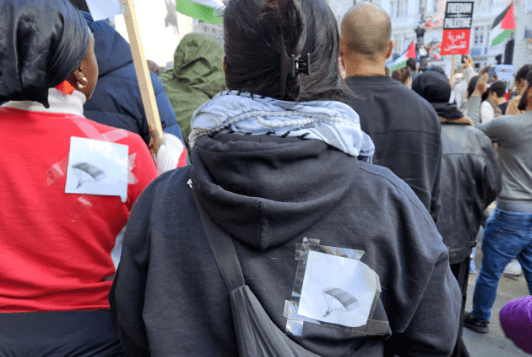Yesterday at Westminster Magistrates’ Court, three women were convicted of terror offences for wearing clothes or carrying signs that appeared to glorify Hamas – and they were let off virtually scot-free.
The leniency of this ruling raises yet more questions about judicial impartiality in this country
At a central London pro-Palestine march the week after the October 7 attack in Israel last year, Heba Alhayek, 29, and Pauline Ankunda, 26, had attached images of paragliders to their backs, while Noimutu Olayinka Taiwo, 27, had attached one to a sign. Paragliders, as had been reported widely in the media, were how Hamas terrorists crossed the Gaza-Israel border to carry out their barbaric pogrom against Israeli civilians. The trio were found guilty of appearing to show support for a terrorist group after a two-day trial. The Judge said there was no evidence that the individuals were supporters of Hamas, but the CPS said displaying the images amounted to the ‘glorification of the actions’ of the terrorist group.
Convicted under Section 13 of the Terrorism Act, they faced a possible six months in prison. But district judge Tan Ikram said he had ‘decided not to punish’ the defendants, instead handing the trio a 12-month conditional discharge each.
From a purely free-speech point of view, this leniency is welcome. Any glorification of the slaughter of more than 1,200 Jews is of course grotesque. Yet as hateful as these kinds of sentiments are, it is generally better to have them out in the open and to know they exist than forcing them underground. Unless it is clear and direct incitement to violence, the best answer to vile speech is rarely punishment or censorship, but counter-speech.
But the leniency of this ruling raises yet more questions about judicial impartiality in this country. These are questions that have been hanging over the justice system more widely since 7 October, after what many saw as a soft-touch approach by the police toward the pro-Palestine marches last autumn.
It’s not as if this leniency toward the ‘paraglider girls’ is down to Britain being a haven for free speech. Quite the contrary: the British state has proven it will come down hard on anyone who seems to violate today’s ever-expanding progressive taboos. Ed West has recently detailed the many sorry examples, such as a woman interrogated by police after photographing a sticker on a trans pride poster; a teenager arrested for saying a policewoman looked like her ‘lesbian nana’; and a Conservative councillor arrested for an alleged hate crime after retweeting a video criticising police treatment of a Christian street preacher.
Indeed, the record of the judge in this case, Tan Ikram, has repeatedly sparked concerns that woke sensibilities may be distorting the British justice system. In an unprecedented ruling in 2022, he jailed police constable James Watts for 20 weeks for sharing racist WhatsApp memes mocking George Floyd, the patron saint of Black Lives Matter. Not only was this sentence extraordinarily harsh, last year Ikram appeared to act against judicial conduct guidance that says judges should not talk about their cases in public, when he publicly boasted about the sentence: ‘This was a police officer bringing the police service into disrepute,’ he told American law students. ‘So I gave him a long prison sentence. The police were horrified by that.’
If Ikram’s comments suggest he might hold a grudge against the police, his later rulings do not dispel that suspicion. In December, he gave six retired Met officers suspended sentences and community service for racist messages sent in a private WhatsApp group chat. This followed his extraordinary ruling that, though the messages were never intended to be seen by anyone else, they were nevertheless ‘offensive to many good people in this country and not only people who might be directly offended’. One of the officers had sent a boomer meme about parrots and was convicted by Ikram on the sole basis of its offensive ‘implication’.
That Ikram has handed down prison sentences for private memes makes his leniency towards the paraglider trio more difficult to swallow. Attempting to explain his decision not to punish the defendants for their support of a terror group, Ikram said the offences had taken place at a time of ‘much passion and polarisation’. ‘You crossed the line’, he said, ‘but it would have been fair to say that emotions ran very high on this issue’. But why should the fact that emotions were running high reduce the severity of the punishment? No less bizarre was his claim that the defendants’ ‘lesson has been well learned’ – despite them being let off by the court.
It is not quite clear which emotions Ikram referred to in his sentence. It is indeed fair to say that emotions were running high at that time. Many will have seen the alarm, shock and distress of British Jews – who first witnessed a barbaric pogrom in Israel, in which many lost friends and loved ones – and then the orgy of violent anti-Semitism it brought to the streets of London. But it seems that to a judiciary steeped in identity politics, it is only certain emotions that count.






Comments